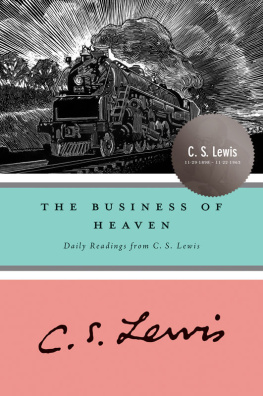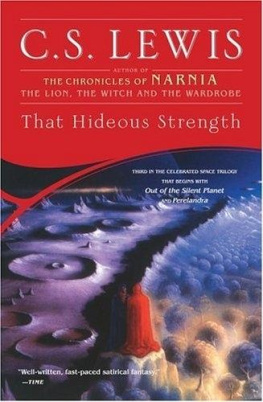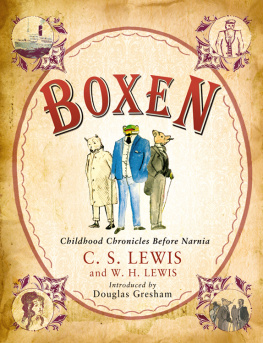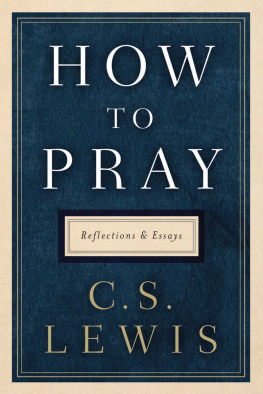
Table of Contents
First Mariner Books edition 2012
This collection and preface by Walter Hooper
copyright 1984 by C. S. Lewis Pte Ltd.
All rights reserved.
For information about permission to reproduce selections from this book, write to Permissions, Houghton Mifflin Harcourt Publishing Company, 215 Park Avenue South, New York, New York 10003.
www.hmhco.com
Excerpts included by permission of The C. S. Lewis Company Ltd.
First Harvest edition originally published 1984
The Library of Congress has cataloged the print edition as follows:
Lewis, C. S. (Clive Staples), 18981963.
The business of heaven.
Bibliography: p.
1. Devotional calendars. I. Hooper, Walter.
II. Title.
BV4812.L482 1984 242'.2 83-26385
ISBN 978-0-15-614863-4 (pb)
e ISBN 978-0-547-53787-0
v6.0315
Preface
Humanity does not pass through phases as a train passes through stations: being alive, it has the privilege of always moving yet never leaving anything behind. Whatever we have been, in some sort we are still. This comes from the opening paragraph of C.S. Lewiss The Allegory of Love. I had thought of this observation so often that, no sooner had I been asked to compile a day-to-day anthology of Lewiss theological writings than the two things were in my mind almost at the same moment. The idea of a train suggested a journey. A journey where? While thinking about this I remembered this passage from Lewiss Reflections on the PsalmsWhen we carry out our religious duties we are like people digging channels in a waterless land, in order that when at last the water comes, it may find them ready... There are happy moments, even now, when a trickle creeps along the dry beds; and happy souls to whom this happens often.
The combination was irresistible and I began imagining what a pleasure it would be to pour the writings of C.S. Lewis into that channel which is called the Christian Year. The Christian Year is like a train which does enjoy the privilege of always moving yet never leaving anything behind because it is based on the two great events of history, the Birth and the Resurrection of Our Lord. Strictly speaking, the Christian Year begins with the first Sunday in Adventwhich word means the coming of Christ. The Christmas season reaches its culmination on January 6 in the Feast of the Epiphany which is the celebration of Christs manifestation to the Gentiles in the person of the Magi. The next and greatest Feast of the Church is that of Easter which lasts forty days and is followed by the feasts of the Ascension, Pentecost, and the Holy Trinity. It is customary to speak of the weeks between Pentecost and Advent as such and such a week after Pentecost or after Trinity. And so it goes on until we return to Advent and begin again. Those of us who take this annual circular journey of the Christian Year find it timeless and yet always refreshingly new.
There may be an odd individual here or there who will say New? Whats so new about a train journey that returns to its original starting point? But I doubt if such an objection will be raised by anyone who has lived within the Christian fold. I realize that there are many Christians of churches less liturgical, but not less devout, to whom the ancient form of the Christian Year will seem a little confusing. But if they follow the order in which these readings are arranged I doubt that they will be confused for long. So far as I am able to judge, the Christian Year takes nothing away from what they already believe. More than that, I believe they will find that what they hold best and dearest about the events in the earthly life of Our Lord will be strengthened. Surely it does strengthen both our belief and our appreciation of the Resurrection of Jesus to keep it in remembrance for forty days rather than to limit this great event to a single day.
I have never heard any Christian complain Christmas again! Easter again! For most of us know that even the longest human life is not long enough for any attentive Christian to imagine that the Feast of the Resurrection is used up. It was in his book Letters to Malcolm that C.S. Lewis said, It is well to have specifically holy places, and things and days, for, without these local points or reminders, the belief that all is holy and big with God will soon dwindle into a mere sentiment. This he said in answer to Pantheism which is perhaps the most appealing heresy there is. At least Lewis found it so, as it delayed for some time his conversion to Christianity.
And Lewis, who drew so much nourishment from the Christian Year, praises it in the book where we are least likely to look for itThe Screwtape Letters. For those who may be meeting these letters for the first time in this anthology I should explain that Screwtape is a senior devil. His letters are addressed to a young devil, Wormwood, whose job it is to secure a young mans soul for Hell. You must remember that when Screwtape speaks of Our Father Below he means Satan. When referring to He or The Enemy Screwtape means God. In the entry of this book for January 17 Screwtape is urging Wormwood to instil in us a horror of The Same Old Thing along with an insatiable desire for Novelty. All this Screwtape admits would be easier if The Enemy had not balanced our love of change by a love of permanence. He gives them, complains Screwtape:
the seasons, each season different yet every year the same, so that spring is always felt as a novelty yet always the recurrence of an immemorial theme. He gives them in His Church a spiritual year; they change from a fast to a feast, but it is the same feast as before.
It seemed, then, to me that the theme of the Christian Year would best serve those who like daily readings. And as I began selecting individual passages I came to believe that this theme could, if properly followed, make the most interesting and diversified use of C.S. Lewiss writings. I hoped, too, that it would go a long way towards defeating Screwtapes plans for destroying Gods spiritual year and inflaming our horror of The Same Old Thing. The Enemy, Screwtape goes on to point out,
loves platitudes. Of a proposed course of action He wants men, so far as I can see, to ask very simple questions; is it righteous? is it prudent? is it possible? Now if we can keep men asking Is it in accordance with the general movement of our time? Is it progressive or reactionary? Is this the way that History is going? they will neglect the relevant questions. And the questions they do ask are, of course, unanswerable; for they do not know the future, and what the future will be depends very largely on just those choices which they now invoke the future to help them make. As a result, while their minds are buzzing in this vacuum, we have the better chance to slip in and bend them to the action we have decided on.
A man would have to be very blind indeed not to see how many conquests Screwtape has made. I am thinking specially about the widespread apostasy among the clergy. I cannot forget my astonishment when I heard a bishop devote the whole of his Easter sermon to Psychical Research. He was delighted to report that some residue of what is now you and me mightjust mightsurvive. Lewis did not know this bishop, but there is a strikingly accurate portrait of him in the entries for May 2225. You are fortunate if those entries are not a portrait of someone you know.
As it turned out, this Psychical Research Bishop did me a favour. He made me remember something very important. If you know Church history you must know that whenever heresy has raised its head and pretended to be the way all sensible people think, it has resulted in a stimulation of orthodox Christian doctrine. Have you never noticed that such things as wars, diseases and famines usually have the effect of bringing out the best in many good people who do all they can to find solutions to these awful problems? Ever since the beginning of the Church, God has raised up great Christians to defeat heresy and strengthen the Faith once delivered. This is one of the reasons I have included entries for a number of those whom Lewis so frequently referred to as the great saints.
Next page

















